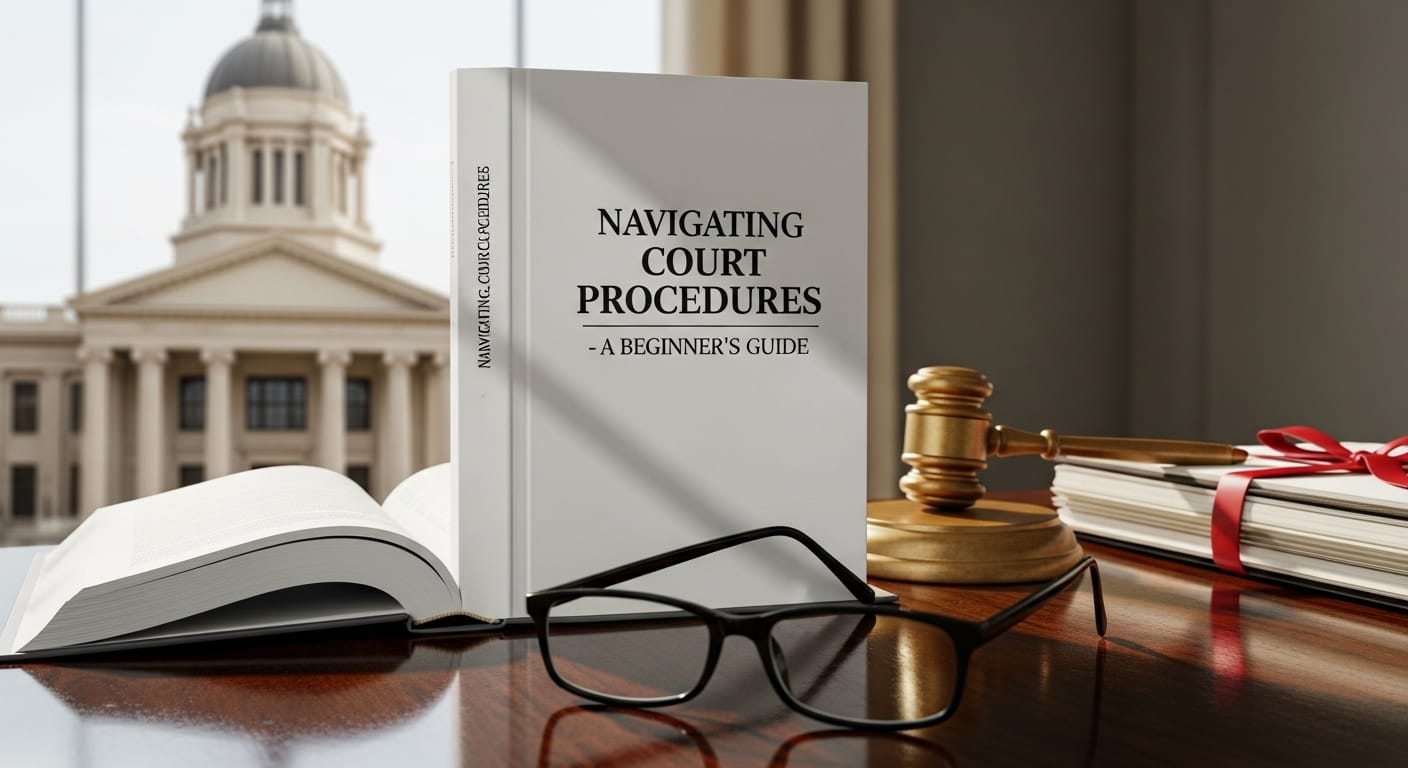So, you’ve found yourself in the legal jungle, and now you’re wondering how to navigate the treacherous waters of court procedures. It’s like trying to find your way through a maze while blindfolded, but don’t worry!
I’m here to help guide you through it with some humor and practical advice. Think of this as your trusty map—minus the “You are here” dot.

Top Takeaways and Key Concepts
Understand Court Basics: Learn roles of judges, lawyers, and jurors to reduce first-time courtroom intimidation.
Filing a Case: Draft a detailed complaint, pay filing fees, and keep track of your case number.
Serving Papers: Hire a process server to ensure legal documents are delivered properly and timely.
Prepare Thoroughly: Gather evidence, practice statements, and review witness testimony to strengthen your case.
Trial Day Readiness: Arrive early, stay calm, speak clearly, and present your side respectfully and confidently.
Summary of This Article
The article guides readers through the court process, from understanding courtroom roles to trial day. It explains filing a case, serving legal papers, and the importance of thorough preparation. The piece emphasizes practicing statements, reviewing evidence, and learning courtroom etiquette to reduce stress. Finally, it advises staying calm, speaking clearly, and reflecting on the experience afterward to improve future legal navigation and outcomes.
Understanding the Basics: What is Court?

First things first, let’s clarify what a court actually is. You might think of it as a fancy room where people argue about stuff like who borrowed whose lawnmower without asking. In reality, courts are places where disputes get resolved based on laws and evidence. Picture Judge Judy but with fewer hair jokes and more legal jargon.
When you step into a courtroom for the first time, it can feel intimidating. There are judges in robes that look like they just stepped out of a Harry Potter movie, lawyers strutting around like they own the place (and sometimes acting like they do), and jurors who may or may not be paying attention.
So why does all this matter? Because understanding these roles helps you know what to expect when it’s your turn to shine—or sweat profusely.
Filing Your Case: The Paper Chase Begins
Now that we’ve set the stage, let’s dive into filing your case—the part that involves more paperwork than you ever thought possible! Honestly, if I had a dollar for every form I filled out during my last legal escapade, I could probably retire on an island somewhere sipping coconut water.
To file a case, you usually start by drafting a complaint or petition—basically saying “Hey! This is what happened!” Make sure to include all relevant details because vague descriptions won’t cut it unless you’re writing an abstract art critique. After that comes filing fees; yes folks, there’s always a price tag attached to justice!
Once filed, you’ll receive a case number—think of it as your case’s social security number. Keep track of this baby because it’s going to pop up everywhere from court documents to phone calls with your lawyer (who will charge you for every minute spent talking about anything other than your case).
Serving Papers: Not Just For Restaurants
By the way, serving papers isn’t just about handing someone food at their table—it’s about officially notifying them that they’re being sued or called into court. Sounds simple enough until you realize this can involve some serious ninja moves if they’re trying to avoid being served!
You’ll need to hire someone known as a process server—think of them as legal ninjas who specialize in delivering bad news (but in compliance with local laws). They’ll make sure those papers reach the right hands, so everyone knows what’s happening—and trust me; avoiding service is harder than dodging raindrops during a storm.
Remember when my cousin tried hiding from his ex-wife’s lawyer? He ended up getting caught at his favorite coffee shop! Let’s just say he was less than thrilled when he realized he couldn’t escape his responsibilities over lattes.
Preparing for Court: Don’t Forget Your Homework
Let’s see…now that everything is filed and served properly, preparation becomes key! Imagine walking into an exam without studying—that’s how it feels if you’re unprepared for court! Review all evidence thoroughly; gather documents and witness statements like they’re Pokémon cards—you want all the best ones in hand!
If you’re representing yourself (which I wouldn’t recommend unless you’re feeling particularly brave), practice what you’ll say ahead of time. Stand in front of your bathroom mirror if necessary; no one else has to know why you’re talking to yourself while brushing your teeth!
Also consider attending other trials beforehand if possible—this gives insight into courtroom etiquette (like not yelling “Objection!” at random moments) and how proceedings typically unfold.
The Day of Trial: Showtime!
Alright folks, it’s showtime! On trial day itself, arrive early so you can find parking—which can be trickier than finding Waldo in one of those books full of distractions. Once inside the courthouse doors, prepare yourself mentally because waiting can feel longer than watching paint dry.
As soon as you’re called before the judge or jury—it gets real fast! Speak clearly and respectfully—even if opposing counsel tries pulling shenanigans worthy of daytime television drama. And remember: even though emotions run high during trials…try not losing sight of why you’re there—to present YOUR side convincingly!
Interestingly enough—I once saw someone faint during closing arguments; talk about dramatic flair! But really…stay calm and collected; after all…you’ve done your homework!
Conclusion: Reflecting on Your Experience
After everything wraps up—win or lose—you’ll likely have learned valuable lessons throughout this journey through court procedures. Sure, there were moments when stress levels soared higher than my cholesterol after Thanksgiving dinner—but reflecting on these experiences will help prepare you better next time around.
And hey! Even if things didn’t go exactly as planned…remember that navigating through life often means facing unexpected challenges head-on—and surviving makes great stories later on (that might even impress friends at parties)!
Suggested Resources:
Legal Information Institute
https://www.law.cornell.edu/wex
Nolo’s Legal Encyclopedia
https://www.nolo.com/legal-encyclopedia
FindLaw
https://www.findlaw.com
American Bar Association
https://www.americanbar.org
Frequently Asked Questions
What are the main roles of people in a courtroom?
Judges oversee proceedings, lawyers represent the parties involved, and jurors evaluate evidence to reach a verdict based on facts and testimony.
How do I file a case in court?
Filing a case involves drafting a formal complaint, paying filing fees, and obtaining a case number, which serves as your official case identifier.
What does “serving papers” mean in legal terms?
Serving papers means delivering legal documents to the opposing party to officially notify them of the case. This is usually done by a licensed process server.
How should I prepare for a court appearance?
Review all evidence, organize documents, and practice your statements. Understanding courtroom etiquette and procedures can also help you feel confident and composed.
What should I do on the day of my trial?
Arrive early, dress appropriately, and remain calm. Speak clearly, show respect to the judge, and stay focused on presenting your case effectively.
Can I represent myself in court without a lawyer?
Yes, you can represent yourself, but it’s recommended to seek legal advice, as court procedures can be complex and self-representation may impact your case outcome.
What should I do after my court case concludes?
Review the results, note lessons learned, and, if necessary, discuss appeal options with your lawyer. Reflecting on your experience helps with future legal preparedness.

Kevin Collier is a legal expert passionate about simplifying complex legal concepts for everyday individuals. With a focus on providing clear, practical information, he covers a wide range of topics, including rights, responsibilities, and legal procedures. Kevin aims to empower readers with the knowledge they need to navigate the legal landscape confidently, ensuring they can make informed decisions regarding their legal matters. Through insightful articles and easy-to-understand resources, he helps demystify the law, making it accessible to all.










